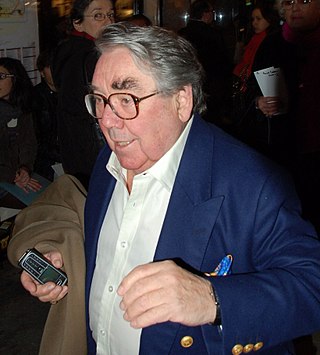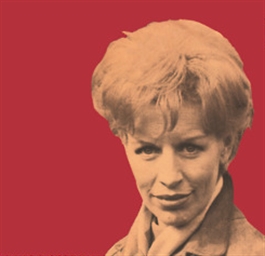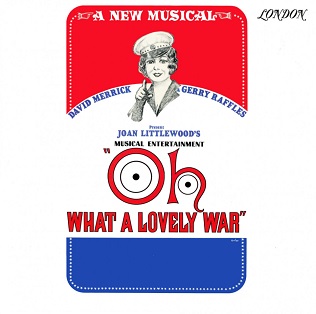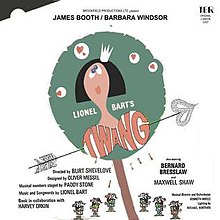
Ronald William George Barker was an English actor, comedian and writer. He was known for roles in British comedy television series such as Porridge, The Two Ronnies, and Open All Hours.

Oliver! is a stage musical, with book, music and lyrics by Lionel Bart. The musical is based upon the 1838 novel Oliver Twist by Charles Dickens.

Dame Barbara Windsor was an English actress, known for her roles in the Carry On films and for playing Peggy Mitchell in the BBC One soap opera EastEnders. She joined the cast of EastEnders in 1994 and won the 1999 British Soap Award for Best Actress, before leaving the show in 2016 when her character was killed off.

Joan Maud Littlewood was an English theatre director who trained at the Royal Academy of Dramatic Art, and is best known for her work in developing the Theatre Workshop. She has been called "The Mother of Modern Theatre". Her production of Oh, What a Lovely War! in 1963 was one of her more influential pieces.

Lionel Bart was an English writer and composer of pop music and musicals. He wrote Tommy Steele's "Rock with the Caveman" and was the sole creator of the musical Oliver! (1960). With Oliver! and his work alongside theatre director Joan Littlewood at Theatre Royal, Stratford East, he played an instrumental role in the 1960s birth of the British musical theatre scene after an era when American musicals had dominated the West End.
Theatre Workshop is a theatre group whose long-serving director was Joan Littlewood. Many actors of the 1950s and 1960s received their training and first exposure with the company, many of its productions were transferred to theatres in the West End, and some, such as Oh, What a Lovely War! and A Taste of Honey, were made into films.

Ronald Balfour Corbett was a Scottish actor, broadcaster and comedian. He had a long association with Ronnie Barker in the BBC television comedy sketch show The Two Ronnies. He achieved prominence in David Frost's 1960s satirical comedy programme The Frost Report and subsequently starred in sitcoms such as No – That's Me Over Here!, Now Look Here, and Sorry!
Marti Webb is an English actress and singer. She appeared on stage in Evita before starring in Andrew Lloyd Webber's one-woman show Tell Me on a Sunday in 1980. This included her biggest hit single, "Take That Look Off Your Face", a UK top three hit, with the parent album also reaching the top three.

Yootha Joyce Needham, known as Yootha Joyce, was an English actress best known for playing Mildred Roper opposite Brian Murphy in the sitcom Man About the House (1973–1976) and its spin-off George and Mildred (1976–1979).

Oh, What a Lovely War! is an epic musical developed by Joan Littlewood and her ensemble at the Theatre Workshop in 1963. It is a satire on World War I, and by extension on war in general. The title is derived from the "somewhat satirical" music hall song "Oh! It's a Lovely War!", which is one of the major numbers in the production.

The Shaftesbury Theatre is a West End theatre, located in Shaftesbury Avenue, in the London Borough of Camden. It opened in 1911 as the New Prince's Theatre, with a capacity of 2,500. The current capacity is 1,416. The title "Shaftesbury Theatre" belonged to another theatre lower down the avenue between 1888 and 1941. The Prince's adopted the name in 1963.

The Theatre Royal Stratford East is a 460 seat Victorian producing theatre in Stratford in the London Borough of Newham. Since 1953, it has been the home of the Theatre Workshop company, famously associated with director Joan Littlewood, whose statue is outside the theatre.
Alan-a-Dale is a figure in the Robin Hood legend. According to the stories, he was a wandering minstrel who became a member of Robin's band of outlaws, the "Merry Men".

James Booth was an English film, stage and television actor and screenwriter. He is best known for his role as Private Henry Hook in Zulu.

Fings Ain't Wot They Used T'be is a 1960 West End musical comedy about Cockney low-life characters in the 1950s, including spivs, prostitutes, teddy-boys and corrupt policemen. The work is more of a play with music than a conventional musical. The original play, by Frank Norman, who though born in Bristol lived his adult life in London, was intended to be a straight theatrical piece, but was supplemented with music and lyrics by Lionel Bart, who also grew up in London's East End.

Alun Davies Owen was a Welsh playwright, screenwriter and actor, predominantly in television. However, he is best remembered by a wider audience for writing the screenplay of The Beatles' debut feature film A Hard Day's Night (1964), which earned him a nomination for the Academy Award for Best Original Screenplay.

Sparrows Can't Sing is a 1963 British kitchen sink comedy, the only film that Joan Littlewood directed. It starred James Booth and Barbara Windsor. It was written by Stephen Lewis based on his 1960 play Sparrers Can't Sing, first performed at Littlewood's Theatre Workshop in the Theatre Royal Stratford East. The producer was Donald Taylor.

Amelia Bayntun was an English stage and television actress.
Sean Kenny was an Irish theatre and film scenic designer, costume designer, lighting designer and director.
This is a summary of 1965 in music in the United Kingdom.















